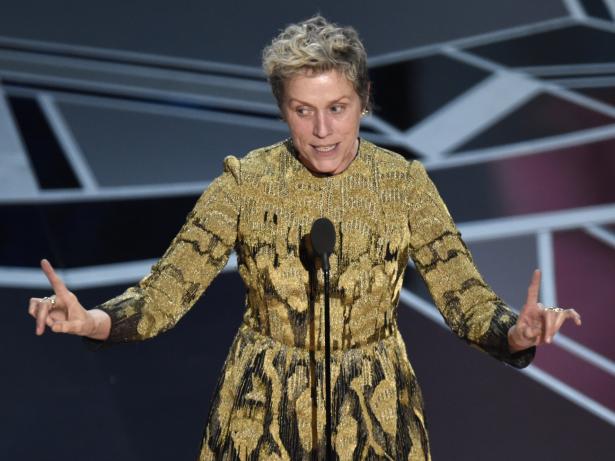Many people watching the Oscars were left scratching their heads when Frances McDormand finished her speech with the phrase “I have two words for you: inclusion rider.”
An “inclusion rider” is a clause that an actor can insist be inserted in their contract that requires cast and crew on a film to meet a certain level of diversity.
The concept was explored in a TED talk in 2016 by Stacy Smith, founder of the Annenberg Inclusion Initiative at the University of Southern California. Having examined the data on diversity in US-produced films, which showed that casting was not representative of the population, she suggested that an “equity clause” or an “inclusion rider” could be part of the solution.
Smith has likened the implementation of it to the NFL’s Rooney Rule.
McDormand was awarded best actress for her performance in Three Billboards Outside Ebbing, Missouri.
She opened by saying “If I fall over, pick me up because I’ve got some things to say”, and then went on to urge all of the female nominees in the room to stand up.
After McDormand’s speech, some actors immediately offered public support to the idea on social media, with Brie Larson committing to it.
I’m committed to the Inclusion Rider. Who’s with me? https://twitter.com/inclusionists/status/970520632789053440 …
In an interview late Sunday night, Smith said she was shocked and grateful to hear that McDormand had given a shout out to her work.
“I’m utterly elated,” she told the Guardian by phone. “It’s a complete surprise.”
Smith said she had worked with attorneys to create specific contract language and has already been in touch with numerous actors interested in the idea.
“The real goal is to counter bias in the auditioning and casting process,” she said, explaining that the contract could also stipulate that if the film ultimately failed to meet the requirements, the distributor would have to pay a “penalty” to a fund that supports female directors and other underrepresented groups.
Smith said A-list stars could use inclusion riders to ensure proper representation and inclusion of women, people of color, LGBT people and people with disabilities.
“The goal is that talent can take the inclusion rider and adopt it in ways that make sense for their values and their beliefs,” she said.
Earlier this year, actor Octavia Spencer revealed that Jessica Chastain had fought for her to make a significantly higher salary by negotiating a joint deal on an upcoming film.
Smith said inclusion riders could be used to ensure fair pay on sets: “The goal here is to really put it in the hands of the most powerful people.”
The professor added that she hopes McDormand’s speech helps the idea spread throughout the industry: “I hope I get calls from the agencies tomorrow saying they want to adopt this across all talent … I’m hoping to make a lot of attorneys really busy.”
Backstage after her win, McDormand said she had recently learned of the concept, adding: “You can ask for or demand at least 50% diversity in not only the casting and the crew. The fact that I just learned that after 35 years in the film business – we aren’t going back.”


 Brie Larson
Brie Larson
Spread the word